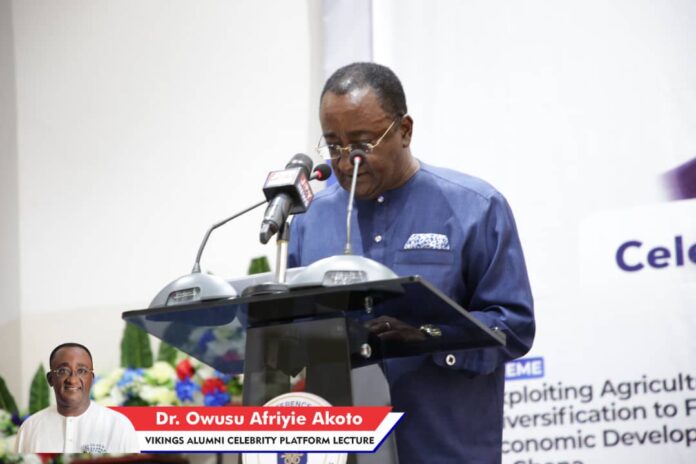A flagbearer-hopeful of the New Patriotic Party (NPP), Dr. Owusu Afriyie Akoto, has said Ghana would need a new innovative business model to do things differently if the country was to succeed in diversifying its agriculture.
This new innovative business model, according to him, should be driven by government structure, supply chain logistics and market access, support big data and technology for evidence-based decision making, research and development, develop and strengthen both input and output market systems and human development.
But, above all, he said, the political will to execute this innovative new business model should never be compromised, stressing that any laxity in the implementation of the model would slow the pace of development by affecting revenue inflow.
Speaking at the Vikings Alumni Celebrity Platform Lecture, organised by the Mensah Sarbah Hall Alumni Association on the occasion of the 60th Anniversary celebration of the Hall on the theme “Exploiting Agriculture Diversification to Fund Economic Development in Ghana,” Dr. Owusu Afriyie Akoto underscored the need for Ghana to prioritise agricultural transformation at the highest level of government, through the implementation of a well-defined vision and strategy.
The former Minister of Food and Agriculture noted that the investments needed to achieve sustainable food systems would be non-negotiable in his vision to transform agriculture for the prosperity of all, citing the first Prime Minister of India, Jawaharlal Nehru, who once said, “Everything can wait, but not agriculture.”
Dr. Owusu Afriyie Akoto said should he be elected the flagbearer of the NPP, and subsequently as the President of Ghana, he would, in addition to the Economic Management Team headed by the Vice President, create an Agricultural Management Team (AMT) chaired by the President himself to drive agricultural development.
“The AMT shall comprise seven Agric-related Ministries, namely: Food & Agriculture, Finance, Trade & Industry, Lands & Natural Resources, Transport, Local Government & Rural Development, and Environment, Science, Technology & Innovation.”
The Agricultural Economist further noted that to improve supply chain logistics and expand market access, infrastructure projects such as feeder roads, hospitals, housing, rural electrification, irrigation, storage will be integral in the agricultural transformation agenda.
He also disclosed that significant investments shall be made in big data and technology for precise and evidence-based decision-making in partnership with the private sector, adding that agricultural policy must be driven by evidence.
“It is essential that policy makers, farmers, and actors in the value chain are trained to access the benefits of data for decision making. Precision agriculture that gives farmers the ability to use inputs more effectively to increase productivity will be prioritised. We shall ensure that target users of technology are involved in every stage of the process. This will provide opportunities to empower the youth and create new jobs.”
The former two-term Member of Parliament for Kwadaso revealed his vision to fund research and development.
“I shall appropriately fund the research endeavours of the diverse national
agricultural research institutions, including the universities, in areas such as agronomy, extension, plant breeding, integrated soil fertility management (ISFM), integrated pest and disease management (IPDM), post-harvest management (PHM) and climate-smart technologies.
We need to curb the effects of climate change and sustain yields in farmers’ fields. We must grow crops that are resilient to withstand drought, heavy rains, and heat. Sustainable investment in science, technology and innovation in agricultural development will offer prosperity to all, including small holder farmers.”
Dr. Owusu Afriyie Akoto, who worked with the UN System for 18 years, spoke of his vision to develop and strengthen both input and output market systems.
“I shall establish an appropriate regulatory framework to leverage private-sector investment across all sectors and promote the efficient distribution of agro-inputs.
“In addition, the regulatory framework will seek to develop platforms for agricultural innovations, output market structures, and incentives that allow for the full realisation of the value of increased production.
A well-funded and competitive private sector can manage and allocate skill and capital to scale-up agro-processing, value addition, and drive long-term, sustainable agribusiness growth for job creation.”
He stressed that another key factor will be to ensure human development.
“A comprehensive strategy will be adopted to develop the human capital needed to take innovations to scale along the agricultural commodity value chains.
This will include farmer field schools, demonstration plots, development of agropreneurs, training of agricultural extension agents, and value chain actors to improve efficiency. We shall also support social development programmes aimed at reducing illiteracy among rural households and farmers to increase the adoption of new technologies. We shall develop curricula in our educational system that shall equip students with the mindset, knowledge, and skills for agricultural education.”
Dr. Owusu Afriyie Akoto further emphasized that the importance of the agricultural sector to Ghana’s economy can be assessed not only by its contribution to GDP but also by the high percentage of the employed population in Agriculture, thus representing an important source of income for the majority of households in the country.
He stressed the need for the creation of common wealth for the good of ordinary Ghanaians.
“We must engage to create common wealth that sees to the needs of the common people. There is a need for a new innovative business model, value addition, productive stakeholder engagement, including the youth, smallholder farmers, and large-scale farmers, and everyone in the agri-business value chain for adequate and affordable food and high value export to fully benefit from the gains of the sector,” he said.
By Stephen Odoi-Larbi








